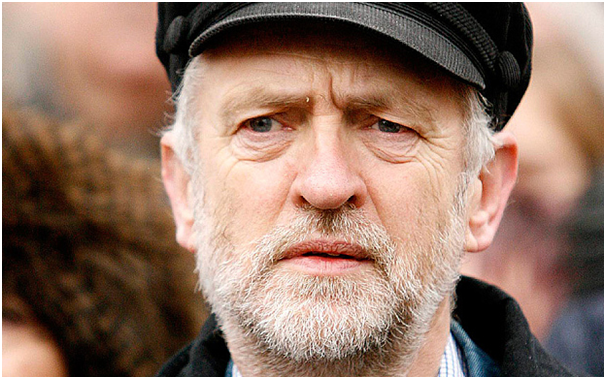All Eyes on UK Labour Leader Jeremy Corbyn During PM Modi's Visit
British Labour Party leader Jeremy Corbyn

NEW DELHI: At least 40 British MP’s have signed an Early Day Motion calling on UK Prime Minister David Cameron to take up the issue of human rights with Prime Minister Narendra Modi. Significantly new Labour leader Jeremy Corbyn is among the list of supporters of this motion that was started by Labour MP Jim Cunningham in July 2015.
The Motion raises a number of issues such as the release of political prisoners in detention in India (it mentioned the Amnesty Special Report on violation of human rights in Kashmir); it condemns the ban on Indian Greenpeace activist Priya Pillai from visiting the UK; it questions the government’s ban on the BBC documentary “India’s daughter’ and efforts to block it from being shown in the UK as well.
The motion has been sponsored by John McDonnell (Labour), Peter Bottomley (Conservative), Paul Monaghan (SNP), Ronnie Campbell (Labour) and Alan Meale (Labour). Four Labour MPs have supported Prime Minister Narendra Modi, and are donating for his visit to the UK now. Rights groups in the UK have started a petition against these MP’s Keith Vaz (Leicester East), Virendra Sharma (Ealing and Southall), Steve Pound (Ealing North) and Seema Malhotra (Feltam and Heston). The petition urges them to “reconisder their decision” and donate money instead to the "families of the victims of the 2002 Gujarat genocide".
Significantly Paul Monaghan is quoted by the IBTimes UK as saying, "While I recognise and respect the right of the people of India to develop their culture and their society as they see fit, I would equally, with the greatest of respect, ask political leaders in India to review the circumstances surrounding the hunger strikes and other protests currently being undertaken by individuals fighting for recognition of human rights in that country."
All eyes, of government and rights groups are currently on Jeremy Corbyn who has taken strong positions in favour of human rights in the past. He is seen as a no nonsense leader, with a declared commitment that most who know him in India believe he will not easily dilute. Corbyn had earlier sponsored a motion two years ago the British Home Department to reinstitute the ban on Narendra Modi for his “role in the communal violence in 2002” in Gujarat. This motion stated: The motion says: This House calls on the Secretary of State for the Home Department to reinstitute the ban on (then) Gujarat’s Chief Minister, Narendra Modi, from entering the UK, given his role in the communal violence in 2002 that claimed the lives of hundreds if not thousands of Muslims, including British nationals; expresses its concern that the ban was lifted for economic and diplomatic reasons, ignoring the role Mr Modi and his administration played in the violence that warranted the ban that stood for more than 10 years; notes that Mr Modi was previously denied a visa on grounds that he was “responsible for or directly carried out…particularly severe violations of religious freedom; and calls on Mr Speaker and the House authorities to ban Mr Modi from entering the Palace of Westminster.
Earlier this year he tabled another motion deploring PM Modi’s ban on the BBC documentary “India’s Daughter” on the rape of the young girl in a moving bus in Delhi. Over 60 MPs had signed the motion in support. Director of the documentary Leslie Udwin had at the time urged PM Modi to withdraw the ban, claiming that New Delhi was also trying to ban it from being shown in other parts of the world.
Corbyn is not new, but rather old to the British political scene being an MP from Islington ever since his first election in 1983. The Mirror perhaps put it well when it wrote after the thumping mandate electing him as the Labour Party leader:
“The 66-year-old is famously one of Labour's most hard-left MPs, campaigning on human rights abroad and anti-austerity issues at home.
If there's a left-leaning protest Jeremy Corbyn is usually there - including addressing anti-austerity activists outside Downing Street last week…..
Yes - one of the most rebellious in Parliament.
Since 2001 he's defied Labour whips more than 500 times, according to voting record website The Public Whip.
That includes on some of the most controversial issues of the Blair years.
Mr Corbyn voted against the Iraq war , ID cards and increasing tuition fees .
He criticised Ed Miliband for promising too much austerity before the election, and said there should be more nationalisation and a £10 minimum wage …..
He opposed apartheid and was one of eight politicians arrested for breaking a protest ban outside London's South African embassy in 1984.
He's spoken out against nuclear weapons , opposes renewing Trident and is a vice-chairman of the Campaign for Nuclear Disarmament.
He's a patron of the Palestine Solidarity Campaign, which urges a boycott of Israeli goods in protest at the situation in Gaza.
He's also the chairman of the Stop the War Coalition, which organised the 2million-strong protest against the conflict in Iraq.
He supported ending British status for Northern Ireland and was criticised for inviting republican Sinn Fein leader Gerry Adams to Parliament.”



